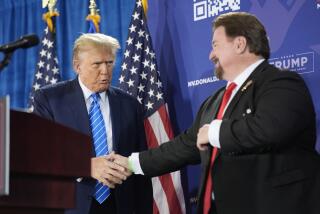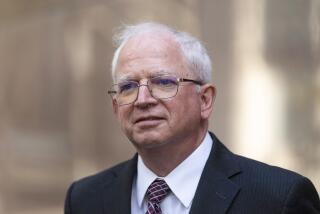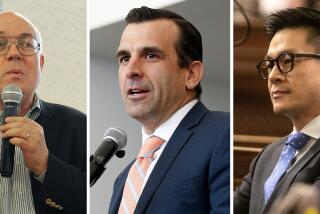Judge Declares Mistrial in Election-Rigging Case
- Share via
A mistrial was declared Monday in the case of Michael R. Goland, the pro-Israel activist accused of trying to engineer the 1986 reelection of Sen. Alan Cranston (D-Calif.) by making illegal donations to a third-party candidate with the aim of siphoning votes away from Cranston’s Republican opponent.
The declaration, by U.S. District Judge Terry J. Hatter, came after a federal jury of eight men and four women proclaimed itself hopelessly deadlocked on all five counts of the indictment after nine days of deliberations.
Hatter acted in the absence of trial Judge Ronald Lew, who was attending a judicial conference. But Lew had indicated Friday, when he last spoke to the jury, that he was prepared to declare a mistrial if it continued to be in disagreement.
Three hours after the mistrial was declared, Assistant U.S. Atty. George Newhouse, the federal prosecutor in the case, announced that the government “is resolved to retry Mr. Goland.” He expressed hope that a retrial of the 41-year-old Los Angeles businessman could begin by the end of the summer.
In the meantime, however, the same jury that deadlocked on the charges against Goland will reconvene next week to hear the continuation of a trial against two of his alleged associates in the campaign financing case, Lyle R. Weisman, 31, of Beverly Hills and Sandor E. Habalow, 45, of West Los Angeles.
Lew had ordered that the case be split after the government had presented its case against all three defendants, putting off the Weisman and Habalow defense until after the verdict on Goland.
Hatter ordered the jury not to discuss its disagreements over Goland with anyone, so it could not be determined how many members were in favor if conviction and how many were for acquittal. A new jury will be convened for a Goland retrial.
During a trial of several weeks, the prosecution had sought to show that Goland, knowing that his support for the right-wing American Independent Party candidate Edward Vallen would be perceived as an underhanded effort to aid Cranston and defeat Republican congressman Ed Zschau, had sought to conceal $120,000 in contributions to Vallen.
Goland’s attorneys, on the other hand, tried to show that Goland--who had spent $1.1 million in a successful independent effort to defeat Sen. Charles Percy (R-Ill.) because of his anti-Israel stands in 1984--had intended to make such a legal, independent effort again.
It is legal under federal election laws for someone to make an independent effort to aid a candidate as long as he does not consult with that candidate or his staff, or make his contributions any part of the candidate’s campaign. In this case, however, the contributions were made to Vallen and the resulting television advertisements on his behalf were part of his campaign. Thus, federal contribution limits to candidates were exceeded.
But, Goland’s attorneys contended, the indirect effort to aid Cranston--who has had a strong pro-Israel voting record for his entire career--was mishandled by a woman Goland hired as a coordinator. Against his wishes, they argued, the effort had wandered into election law violations.
Goland’s chief attorney, Nathan Lewin of Washington, in a strongly worded statement after Monday’s mistrial, asserted that the government should at most have taken its allegations before the Federal Election Commission for a disciplinary proceeding.
Lewin said that it was a mistake “to use the criminal law to enforce what is a welter of impossible provisions in the federal election laws” and that the case should not now be pursued to a retrial. Although he would not divulge what Goland’s legal fees to defend himself have been, he said the fees alone have been “a strain” on the defendant.
Newhouse called the government’s case “an extremely important” effort to enforce the election laws that could well set a precedent on the effectiveness of those laws.
Vallen, after the advertising campaign on his behalf, received slightly more votes than the difference between the winning Cranston and the losing Zschau, thus indicating a possibility that the results of the election could have been tipped to Cranston.
More to Read
Sign up for Essential California
The most important California stories and recommendations in your inbox every morning.
You may occasionally receive promotional content from the Los Angeles Times.













